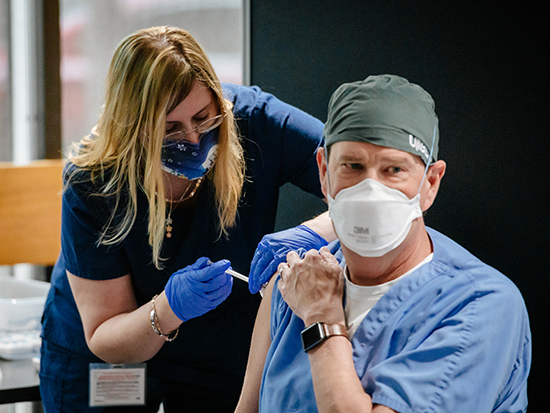 The study followed 5,000 health care workers in high risk environments for COVID-19.
The study followed 5,000 health care workers in high risk environments for COVID-19.
(Photography: Steve Wood)A study in health care workers across the United States found that both of the mRNA COVID-19 vaccines, made by Pfizer-BioNTech and Moderna, are highly effective in preventing symptomatic COVID-19 in the real-world clinical setting. More than 250 UAB Medicine employees participated in the study.
The study showed that the vaccines appeared be effective for those over 50 years of age, those from racial or ethnic groups that have been disproportionately affected by COVID-19, those with underlying medical conditions, and those with higher levels of exposure to patients with COVID-19. Vaccine effectiveness was lower in immunocompromised people.
The study, published in the New England Journal of Medicine on Sept. 22, found that the effectiveness of a two-dose regimen was 96 percent for Moderna vaccine and 89 percent for the Pfizer-BioNTech vaccine.
“Our effectiveness findings reinforce previous data from the clinical trials for these vaccines,” said Walter Schrading, M.D., professor in the Department of Emergency Medicine at the University of Alabama at Birmingham and a co-author of the study. “The value of this study is that it shows how well these vaccines work in the real world among a high risk group — health care workers.”
The study, Project PREVENT, was sponsored by the Centers for Disease Control and Prevention. Project PREVENT collected data on about 5,000 health care workers nationwide who were tested for COVID-19 between December 2020 and May 2021. Schrading is the primary investigator for UAB’s participation in the trial.
 Walter Schrading, M.D.
Walter Schrading, M.D.
(Photography: Chris Carmichael)The study made use of employee testing protocols for COVID-19 at 33 participating medical centers in the United States, enrolling 1,482 cases and 3,449 controls. The cases, participants who were symptomatic and tested positive for COVID-19, were compared to the controls, people with COVID-like symptoms who tested negative for COVID-19. All study participants completed a survey that provided demographic information, risk factors for severe disease from COVID-19, job type and their vaccination status.
The study showed that the effectiveness of complete vaccination was high for both vaccines, but slightly better for Moderna than for Pfizer-BioNTech.
Because of the relatively short time period of the study, the findings do not provide an answer to how long vaccines continue to provide protection against COVID-19. In addition, the study data were collected before the emergence of the delta variant, so vaccine effectiveness may have changed compared to effectiveness against earlier variants.
“We continue to enroll and collect data in this trial to study how the vaccines perform as the pandemic evolves,” Schrading said. “Keeping track of changes in vaccine effectiveness and duration of protection is critical to our ability to protect health care workers and keep our communities safer.”
Schrading says any UAB medicine employee who has had a recent COVID-19 test, whether positive or negative, may be eligible to participate in this ongoing work. Employees will see an invitation link in their test result email.
Thanks go to co-investigator Cameron Crosby, M.D.; UAB Medicine Employee Health, led by Sarah Nafziger, M.D.; the emergency department research team, led by Michael Kurz, M.D., and Joel Rogers; and the many UAB employee participant volunteers.